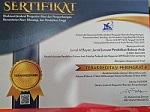Creativity in Narrative Writing: Utilizing Mind Mapping with Ethnic Identification Model in Higher Education
Abstract
Keywords
Full Text:
PDFReferences
Al Kamli, Hadeel Mohammad. “The Effect of Using Mind Maps to Enhance EFL Learners’ Writing Achievement and Students’ Attitudes Towards Writing at Taif University.” Arab World English Journal 1 (2019): 1–92.
Abkar Alkodimi, Khaled and Ahmed Mohammed Hasan Al-Ahdal. “Strategies of Teaching Writing at Saudi Tertiary-Level Institutions: Reality and Expectations.” Arab World English Journal 12, no. 2 (2021): 399–413.
Alqasham, Fahd Hamad, and Arif Ahmed Mohammed Hassan Al-Ahdal. “Effectiveness of Mind-Mapping as a Digital Brainstorming Technique in Enhancing Attitudes of Saudi EFL Learners to Writing Skills.” Journal of Language and Linguistic Studies 17, no. 2 (2021): 1141–1156.
Altakhaineh, Abdel Rahman Mitib, and Nimra M. Shahzad. “Using Pictures in Teaching Metaphorical Expressions to Arabic-Speaking EFL Learners.” The Asian Journal of Applied Linguistics 7, no. 1 (2020): 32–44.
Fadilla, Indri Resti, Anissa Bella, Uke Khairunnisa, and Yuninda Ningsih. "Pengaruh Pembelajaran Mind Mapping terhadap Kemampuan Menulis Karangan Narasi di Sekolah Dasar." Jurnal Pendidikan dan Konseling 4, no. 6 (2022): 6417-6420.
Fu, Qing-Ke, Chi Jen Lin, Gwo Jen Hwang, and Lixin Zhang. “Impacts of a Mind Mapping-Based Contextual Gaming Approach on EFL Students’ Writing Performance, Learning Perceptions and Generative Uses in an English Course.” Computers and Education 137 (2019): 59–77.
Gallagher, Kay, and Afaf Bataineh. “An Investigation into the Linguistic Landscape of Translingual Storybooks for Arabic-English Bilingual Children.” Journal of Multilingual and Multicultural Development 41, no. 4 (2020): 348–367.
Hajar, Anas. “Shifting Learning Strategies and Future Selves of Arab Postgraduate Students in Britain: A Qualitative Inquiry.” Innovation in Language Learning and Teaching 15, no. 3 (2021): 233–246.
Haris, Abdul, M. D. Qutbuddin, and Ahmad Fatoni. “Teachers’ Trends in Teaching Arabic in Elementary Schools.” Izdihar: Journal of Arabic Language Teaching, Linguistics, and Literature 4, no. 2 (2021): 195–210.
Hasan, Moin, and Mohammad Rezaul Karim. “Scaffolding Effects on Writing Acquisition Skills in EFL Context.” Arab World English Journal 10, no. 4 (2019): 288–298.
Hassan, Isyaku, Ayuni Madarina Abdul Rahman, and Mohd Nazri Latiff Azmi. “Development of English Writing Skills through Blended Learning among ESL Learners in Malaysia.” Arab World English Journal 7, no. 1 (2021): 377–389.
Jumari, Jumari, Missriani, and Yessi Fitriani. “Peningkatan Kemampuan Menulis Narasi Melalui Strategi Peta Konsep (Concept Mapping) pada Siswa Kelas V SDN 1 Makarti Jaya Kabupaten Banyuasin.” Jurnal Pendidikan Tambusai 5, no. 1 (2021): 1983–1995.
Lingga, Melaty and Mawary BR. “Pengaruh Penggunaan Diksi Terhadap Keterampilan Menulis pada Mata Pelajaran Bahasa Indonesia Kelas V SDN 040457 Berastagi Tahun Ajaran 2018/2019." Dissertation, Universitas Quality, 2019.
Magdalena, Ina, Nurul Ulfi, and Sapitri Awaliah. “Analisis Pentingnya Keterampilan Berbahasa pada Siswa Kelas IV di SDN Gondrong 2.” Edisi: Jurnal Edukasi dan Sains 3, no. 2 (2021): 243–252.
Maimunah, Siti, Hetilaniar Hetilaniar, and Susanti Faipri Selegi. “Peningkatan Keterampilan Menulis Narasi Melalui Teknik Reka Cerita Gambar Siswa Kelas V Sekolah Dasar.” Jurnal Pembahsi (Pembelajaran Bahasa dan Sastra Indonesia) 11, no. 2 (2021): 123–132.
Marpaung, Willi Rahim, and Zulfahmi Lubis. “Strategi Penerapan Lingkungan Bahasa Arab dalam Meningkatkan Kemahiran Berbahasa Arab di Pesantren Modern Darussalam.” Inspiratif Pendidikan 12, no. 1 (2023): 183–191.
Mirnawati, Lilik Binti. “Keefektifan Model Pembelajaran Inovatif dengan Menggunakan Mind Mapping dalam Pembelajaran Menulis Narasi Siswa SD.” Belajar Bahasa: Jurnal Ilmiah Program Studi Pendidikan Bahasa dan Sastra Indonesia 4, no. 1 (2019): 82-92.
Noermanzah, Noermanzah. “Bahasa Sebagai Alat Komunikasi, Citra Pikiran, dan Kepribadian.” Prosiding Seminar Nasional Bulan Bahasa (Semiba)." (2019): 306–319.
Nurkamilah, Silvi, Dilla Fadhillah, and Sumiyani. “Analisis Kesulitan Menulis Karangan Narasi Siswa Kelas V SDN Duri Kosambi 06 Pagi,” Jurnal Pendidikan dan Konseling (JPDK) 4, no. 5 (2022): 1202–1205.
Rini. “Pembelajaran Kemahiran Menulis Bahasa Arab Plikatif.” Al-Muktamar As-Sanawi li Al-Lughah Al-'Arabiyyah (Musla) 1, no. 1 (2020): 18–42.
Selvaraj, Melanie, and Azlina Abdul Aziz. “Utilizing Flow Chart in Writing Narrative Essay: English as Second Language Students’ Perceptions.” International Journal of Academic Research in Business and Social Sciences 10, no. 3 (2020): 1-16.
Shi, Yinghui, Huiyun Yang, Yi Dou, and Yong Zeng. “Effects of Mind Mapping-Based Instruction on Student Cognitive Learning Outcomes: A Meta-Analysis.” Asia Pacific Education Review 24, no. 3 (2023): 303–317.
Sirait, Dahlia, and Aminda Tri Handayani. “Analisis Pemecahan Masalah Kemampuan Menulis Mahasiswa Melalui Media Pembelajaran Berbasis Video.” Jurnal Penelitian Pendidikan Bahasa dan Sastra 5, no. 1 (2020): 43–49.
Stokhof, Harry, Bregje de Vries, Theo Bastiaens, and Rob Martens. “Using Mind Maps to Make Student Questioning Effective: Learning Outcomes of a Principle-Based Scenario for Teacher Guidance.” Research in Science Education 50, no. 1 (2020): 203–225.
Suhaimi, Noor Diana, Maslawati Mohamad, and Hamidah Yamat. “The Effects of Whatsapp in Teaching Narrative Writing: A Case Study.” Humanities and Social Sciences Reviews 7, no. 4 (2019): 590–602.
Wati, Santi Herlina, and Anang Sudigdo. “Keterampilan Menulis Karangan Narasi Sejarah Melalui Model Pembelajaran Mind Mapping Bagi Siswa Sekolah Dasar.” Proseding Seminar Nasional PGSD UST 1, no. 1 (2019): 274–282.
Yahya, Muhyidin, Maftuhati Maftuhati, Abdul Hayyi Mustofa, and Zakiyah Arifa. “Online-Based Arabic Learning Management During the Covid-19 Pandemic Era: Plan, Implementation and Evaluation.” Al-Ta’rib: Jurnal Ilmiah Program Studi Pendidikan Bahasa Arab IAIN Palangka Raya 9, no. 1 (2021): 85–98.
Yan, Zi, John Chi Kin Lee, Sammy King Fai Hui, and Hongling Lao. “Enhancing Students’ Self-Efficacy in Creativity and Learning Performance in the Context of English Learning: The Use of Self-Assessment Mind Maps.” Frontiers in Psychology 13 (2022): 871781.
DOI: http://dx.doi.org/10.24042/albayan.v16i1.19800
Refbacks
- There are currently no refbacks.
Copyright (c) 2024 Jurnal Al Bayan: Jurnal Jurusan Pendidikan Bahasa Arab
License URL: https://creativecommons.org/licenses/by-nc-sa/4.0
Editorial Office:
Jurnal Al Bayan: Jurnal Jurusan Pendidikan Bahasa Arab, Arabic Education Study Program, Faculty of Education and Teachers Training, Unversitas Islam Negeri Raden Intan Lampung
Jl. Endro Suratmin 1 Sukarame, Bandar Lampung 35131-Indonesia
e-mail: jurnalalbayan@radenintan.ac.id
http://ejournal.radenintan.ac.id/index.php/albayan/index
Jurnal Al Bayan: Jurnal Jurusan Pendidikan Bahasa Arab is licensed under a Creative Commons Attribution-ShareAlike 4.0 International License. p-ISSN 2086-9282 | e-ISSN 2549-1229









